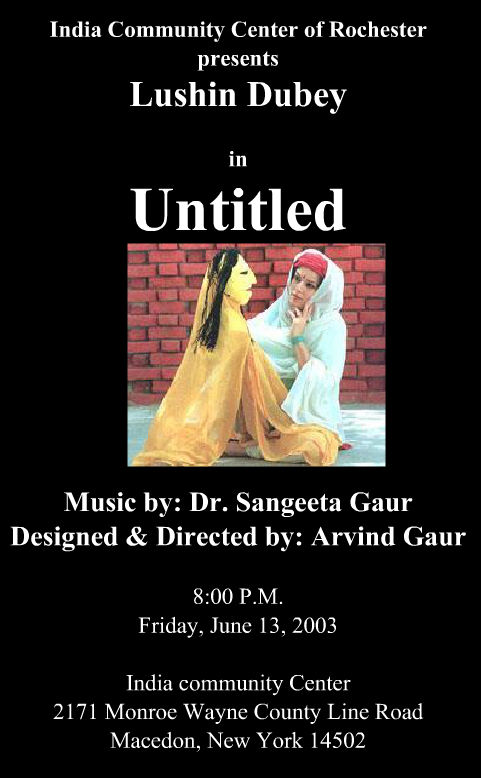
Based on
Dario Fo's "MEDEA" and on a story by विजयदान देथा Directed By Arvind Gaur

'Untitled' is a play which gives a voice to the woman's case. It is a pendulous swing between 2 stories, the Rajasthani writer, Vijay Dan Detha's 'Nyari Nyari Maryada', and Dario Fo's 'Medea'.
Scene 1: The old nurse in Medea speaks about Medea's jealousy because Jason has left Medea for a younger woman.
Scene 2: The narrator/Lushin introduces the story of the King and his court poet, Barahatji. Barahatji's words of wit and wisdom hold medicinal value for the King, who upon hearing them, relieves himself of innumerable gases which accumulate in his distended belly! Barahatji, in spite of being the epitome of suavity, winsome looks and wisdom, is quite another 'macho creature' when he sets eyes on his wife, who he believes should know her 'place', no matter what, even if he brings home another woman, which he is wont to do, whenever it suits him..
Scene 3: Young Medea recalls how she was a sweet 16 once, and how Jason once loved her..
Scene 4: The King and Barahatji in conversation. The King asks Barahatji, 'Why is it that a man is never satisfied with one woman.. Why this constant hunger and craving for more..?' Barahatji, amused, retorts, 'Can halwa or the same sweet be tasted repeatedly Sir? Arre, we have to offer variety to our taste buds ...no Sire? 'For a long time the Rani Sahiba listens to their discourse mutely ...finally unable to contain herself says,' When you men tire of the same woman, you want variety. What of us women... what when we tire of the same husband? The court is dumbstruck.
Scene 5: The Rani returns to the interior of the palace, and recalls her 5th day of marriage when in the flush of being a newly wed bride, she had waited for hours for her husband's arrival ,...and how the king had entered their bedroom with a young girl ...who the Rani lovingly welcomed as if she were her daughter ...and who the king subsequently ...raped! The Rani had seen the crime before her very eyes and screamed with hurt and helplessness!
Scene 12: The Rani tells her maid, whilst bathing, that she will disclose much the next morning in the Court..
Scene 13: The final durbar Scene.. when the Rani tells all ...a broadside of the male hypocricy in society.. about the 11 year old girl's pain, and her mother's... and so on ... In the end the sweeperess, now seen as a puppet rejoices and celebrates the Rani's new found happiness and confidence ... The last scene is a frenzied dance of the sweeperess..
About the Actress
Lushin Dubey did her Masters in Science in Childhood and Special Education in the US and then was deeply involved in teaching mentally challenged children in the US and then in India at the American Embassy School. In 1986, she started a Youth, Theatre Group, `Kids World' with her cousin, Bubbles
Sabharwal. Together they have produced, scripted and directed many plays, establishing Kids World as a pioneer in youth theatre group in India. Six years back, she was involved in many Shakespearean productions. Produced and acted as Desdemona in Othello - which won the Edinburgh Fringe Award in
2000. Lushin has acted in several serials and also in an experimental production `Chaos Theory' in New York and has recently finished acting in her first feature film `Perfect Husband'.
About the Director
Arvind Gaur heads the Delhi based theatre group ASMITA which is committed to innovative and socially relevant theatre. His best works include Girish Karnad's Tughlaq and Rakt Kalyan(Taledarda), Mahesh Dattani's Final Solutions and Tara, Dharmaveer Bharti's Andha Yug, Ashok Lal's Ek Mamooli
Aadmi, Samuel Beckett's Waiting for Godot, Swadesh Deepak's CourtMartial, Jan Octnasek's Romeo Juliet & Darkness, Bertact Brecht's The Good Women of Setzua and The Caucasian Chalk Circle, Arthur Miter's The Crucible, Bhishma Sehani's Madhavi, Dario Fo's Story of the Tiger G.D.Deshpande's
Antim Divas, Bubbles Sabharwal's Women in Black and numerous others. His plays have the distinction being acclaimed amongst the best plays in Delhi for seven consecutive years.
Become a Patron/Sponsor of Fall Season 2003
The Indian Classical Music and Dance Society of the ICC is committed to bring high quality
professional programs to Rochester. Our budget for the Fall season will be approximately $16,000. We
can present these programs only with the help of the patrons (donations of $500 or more) and
sponsors. We appeal to all the music and dance lovers in the community to contribute generously.
Your contributions will enrich our lives, and support the art and the artists. Please make the cheques
payable to ICC and send to C. P. Kamath, 15 Bretton Woods Drive, Rochester, NY 14618. Thank you.